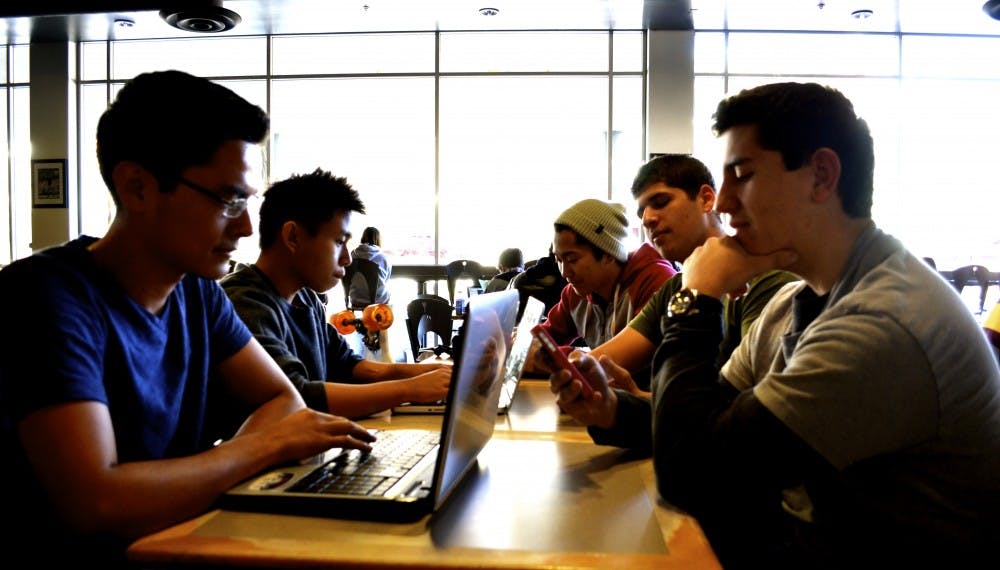 Biological business students are cooking up the information on global food distribution among other concepts.
Biological business students are cooking up the information on global food distribution among other concepts.Photo by Luu Nguyen
In the deep recesses of the ASU campuses, majors unheard of to the potential freshman or the unhappy sophomore looking to change, await their newest students.
Patrons of these hidden majors weave extensive patterns, fight for world peace, analyze crime scene evidence and design video games.
Whether you chose your major based on passion or career outlook, spending just a year at college could turn your plans upside down.
So here’s your chance to check out some of the lesser-known majors students may choose to pursue when picking an academic pathway to tread.
There’s more to yarn and thread than just knitting scarves. Students in the art concentration of fibers in the Herberger Institute for Design and the Arts study the surface design of fabric and develop their own thread-works with a variety of tools. Whether they are dyeing cloths, making felt or painting silk, fibers students study a unique art form inherent to our collective human history.
Fibers from The State Press on Vimeo.
Could they be called the hippies of ASU? Who’s to say; but the aim of peace studies is to reject the view that peace blossoms from violence and to explore
 Peace out.
Peace out.Photo by Luu Nguyen
the different dynamics of peace as a process. With the Center for the Study of Religion and Conflict, students studying peace analyze cultural, social, philosophical and spiritual ideas of every Miss America’s wish for the world, and how they can advance those ideas past words spoken through a microphone.
Biological business: the business of food. How food gets from the soil of the country crops to refrigerators is the concern of students studying for a bachelor of sciences degree in this major. Through the College of Technology and Innovation and the Morrison School of Agribusiness and Resource Management, students study both the business side of global food distribution and issues like sustainability and food safety to help fight those nasty cantaloupe recalls.
 ASU has its own criminal minds in the making.
ASU has its own criminal minds in the making.Photo by Luu Nguyen
Crime scene investigators — that is literally what forensics majors in the New College of Interdisciplinary Arts and Sciences’ School of Mathematical and Natural Sciences are studying to become. Loaded with chemistry and biology lab work, students in the forensics program are being prepared for careers analyzing blood and rope fibers.
They are the zealous people overseeing the ensemble, nearly dancing to the music while keeping time and cues for the musicians. The doctoral program in conducting s pits out these performers who don’t even need instruments in their hands to bring forth a unique sound. Students in the conducting program study technique for bringing all the aspects of a symphony together into one harmonized performance with a flick of their baton. Thirty students have finished the program and have either been successful teachers or as professional conductors.
Conducting from The State Press on Vimeo.
It’s the beating drums and rain sticks of Native American tribes, the painstaking plucking of Chinese guitars, the deep, soulful voices of South American mariachi. Plainly stated, ethnomusicology is the study of the music of the world and not just Western art music. Music students in the Herberger Institute for Design and the Arts approach music from several different aspects including cultural, social, cognitive and biological, to find our combined, global sound.
Ethnomusicology from The State Press on Vimeo.
As a branch of the W. P. Carey School of Business’s Doctor of Business Administration program, students may enter into the graduate management program and learn skills to apply to China’s economy. With the rate at which China is globalizing is constantly increasing, so this program aims to train students to take on this growing part of the global business by focusing on technology innovation and research to transform the industries of China.
For the people, by the people: that’s what our country was founded on, right? Well, that’s exactly what students in the participatory governance masters program are advocating. Through the School of Public Affairs and the College of Public Programs, students study the history of democratic activities in both America and the rest of the world. Using this information, they learn how to effectively design and carry out functions of public engagement and enforce the people’s voice in governmental processes.
Transborder Chicano & Latino Studies Concentration in Media and Expressive Culture
Song, dance, literature and performance are all tools humans have used to express themselves and their cultures. Students of the media and expressive culture concentration in the College of Liberal Arts & Sciences study these mediums in terms of the Mexican and Chicano communities. Rich with artists, musicians, writers and historians, these students study exactly what makes the Latino experience a culture that has become a significant part of America’s society.
Digital Culture, Media Processing
Students of this major are the ones coming up with all those cool graphics we experience when wandering through the virtual worlds of video games.
 Among the ASU population there is a culture of HTML.
Among the ASU population there is a culture of HTML.Photo by Luu Nguyen
Programming, code-writing and graphic development are just some of the concepts students work on in the media processing concentration of the digital culture program. This program, shared between the Herberger Institute and the Ira A. Fulton Schools of Engineering, looks at the role of digital technology and how to better integrate its resources into our day-to-day lives.
Reach the writer at mamccrea@asu.edu or via Twitter at @Mackenziemicro and the videographer at luunguyen94@gmail.com or @luu_t_bguyen




